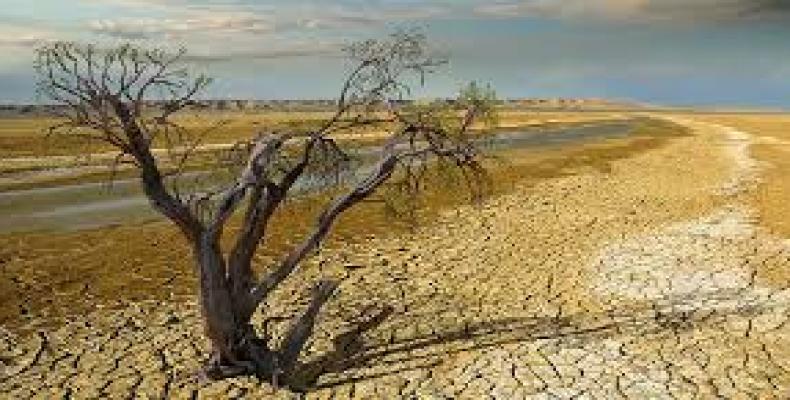United Nations, September 23 (RHC)-- A damning new UN report published on Sunday warned the world was falling badly behind in the race to avert climate disaster as a result of runaway warming, with the five years ending 2019 set to be the hottest ever.
The report came ahead of a major UN climate summit on Monday when Secretary-General Antonio Guterres is encouraging countries to increase their greenhouse gas reduction targets. The report "highlights the urgent need for the development of concrete actions that halt global warming and the worst effects of climate change", said its authors, the Science Advisory Group to the summit.
The average global temperature between 2015 and 2019 is on track to be the hottest of any five-year period on record, according to the report, which was compiled by the World Meteorological Organization.
The period "is currently estimated to be 1.1 degrees Celsius above pre-industrial [1850-1900] times and 0.2 degrees Celsius warmer than 2011-2015", it said. The past four years were already the hottest since records began in 1850.
"I think the danger is growing - that means we have much less time to solve the problem than we thought we had. Basically if we want to tackle climage change, we have stop burning fossil fuels," Tom Burke, chairman of anti-carbon group E3G, told Al Jazeera.
Guterres said last week the world was "losing the race" on climate change with the latest report spelling out the extent to which the gap between what is required and what is happening is widening. Rather than falling, carbon dioxide grew two percent in 2018, reaching a record high of 37 billion tonnes.
More importantly, there is also no sign yet of reaching what is known as "peak emissions", the point at which levels will start to fall, though these are not growing at the same rate as the global economy.
Patrick Verkooijen, chief executive of the Global Centre on Adaptation, told Al Jazeera governments needed to show more ambition on their commitments - not only to mitigatiom, but also in investments for adaptation.
"The effects of climate change are here and now," Verkooijen said from New York. "Whether you are an auto worker in Bangkok or a farmer in Africa or an elderly woman in Paris we are all impacted by climate change today."
The 2015 Paris Agreement saw countries lay out national targets to reduce their emissions in order to limit long term temperature rise by either 2 degrees Celsius or 1.5 degrees Celsius.
These are benchmarks that will limit in important ways the impact of warming on world weather systems. But even if all countries meet the goals they set themselves, the world will warm by 2.9 degrees Celsius to 3.4 degrees Celsius, the report found.
The current levels of ambition would need to be tripled to meet the 2 degrees Celsius goal and increased five-fold to meet the 1.5 degrees Celsius goal - technically still possible.
"This reads like a credit card statement after a five-year long spending binge," said Professor Dave Reay, chair in Carbon Management at the University of Edinburgh. "Our global carbon credit is maxed out. If emissions don't start falling there will be hell to pay."
If the world keeps temperatures to the 1.5-degree Celsius goal instead of the 2-degree one, 420 million fewer people will be exposed to heat waves and 10 million fewer will be vulnerable to sea level rise, NASA climate scientist Cynthia Rosenzweig said on Sunday at a UN session.
In 2018, global carbon dioxide was 407.8 parts per million (ppm), 2.2 ppm higher than 2017 and set to reach or exceed 410 ppm by 2019. "The last time Earth's atmosphere contained 400 parts per million CO2 was about 3-5 million years ago," the report noted.
At that time, global mean surface temperatures were 2-3 degrees Celsius warmer, ice sheets at both poles melted, and seas were 10 to 20 metres higher. Other major findings include the extent of Arctic summer sea ice has declined at a rate of 12 percent per decade over the past 40 years, with the four lowest values between 2015 and 2019.
Overall, the amount of ice lost from the Antarctic ice sheet increased by a factor of six each year between 1979 and 2017, while glacier loss for 2015-19 was also the highest for any five-year period on record.
Sea-level rise is also accelerating as is the process of acidification, with an increase in 26 percent in acidity today compared to pre-industrial periods, as a result of absorbing increased carbon dioxide in the atmosphere.
The report also found heatwaves were the deadliest weather hazard in the 2015-19 period, affecting all continents and setting new national temperature records. The summer of 2019, which included the hottest ever month on record (July), saw unprecedented wildfires in the Arctic. In June, these were responsible for emitting 50 megatons of carbon dioxide.
The report also comes at a time of increasing mobilisation over the question of climate change with millions taking part in a youth-led global strike on Friday, before the first UN youth climate summit on Saturday.
Millions of people around the world, from New York to Paris, Nairobi, Seoul, Bangkok, Islamabad and Johannesburg, have taken part in a global protest, calling for climate action. There is a sense of urgency, Guterres said, because "climate change is the defining issue of our time".
"For the first time, there is a serious conflict between people and nature, between people and the planet," the UN chief said. A larger, more international report looking at climate change and oceans and ice will be released by the Intergovernmental Panel on Climate Change on Wednesday.
"This new WMO report highlights the importance of making more progress on reducing emissions of carbon dioxide," Cornell University climate scientist Natalie Mahowald said. "Hopefully this latest UN Climate Summit will motivate more action."


